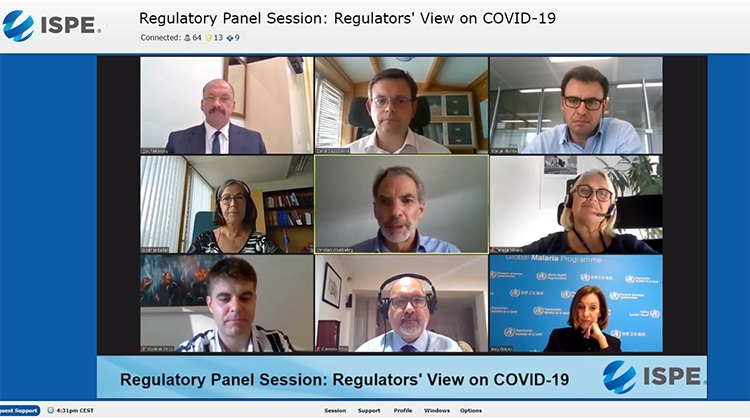Regulatory Panel Addresses COVID-19 Challenges

2020 ISPE Europe Annual Conference
At the 2020 ISPE Europe Annual Conference on 16–17 September, which was a virtual conference, three regulatory panel discussions included more than 20 regulators from eight countries and the European Medicines Agency (EMA), Medicines and Healthcare Products Regulatory Agency (MHRA), Pharmaceutical Inspection Co-operation Scheme (PIC/S), European Directorate for the Quality of Medicines (EDQM), the Russian State Institute of Drugs and Good Practices, and the World Health Organization (WHO). This article summarizes the panel discussion on Learnings from COVID-19 and some related consideration by the ISPE moderators. The session explored how the industry and regulators are managing the challenges presented by COVID-19 and what can be learned for the future.

Joey Gouws, PhD, introduced the topic and discussed how WHO is involved in COVID-19 crisis management, including:
- eWorkflow: WHO has reorganized internal processes to leverage digital tools to increase efficiency
- HIM Data Flow: WHE/HIM stood better data workflow to collect cases/deaths from the member states and build information products (manual data, PDF, data flow, dash board) on top of that such as
- Go.Data: distribute contact tracing tool to 50 member states
- EWARS: some LMIC have leveraged existing WHO EWARS tool developed during Ebola for data capture, Early Warning, Alert & Reporting System
- Position papers, WHO guidance document on use of digital tools
Remote inspections_ Live interactions and dynamic interviews
To guide the panel discussion, the moderators asked the following questions to explore the regulators’ opinions on industry/regulator interactions during the COVID-19 pandemic, what impacts these interactions have had, potential changes for the industry, the impact of digitalization on business continuity, development of new medicines, and management of regulatory compliance.
What is your view on the reaction of the industry in terms of preparedness, reactivity, and crisis management?

Susanne Keitel, observed the unprecedented situation presented by COVID-19, which took regulators and the industry by surprise. She said it is crucial to learn from what has happened and make sure that the next generation will be able to base their actions on this experience and avoid repeating previous mistakes.
A consideration that can be done by ISPE on this important point: ISPE, given its mission, could assume a role as custodian of learnings on behalf of the industry and support the industry to be better prepared for pandemics. Regular crisis team exercises may be one of the suggestions to encourage the industry to learn from the current situation. David Churchward, Deputy Unit Manager, Inspectorate Strategy and Innovation, MHRA, said that despite the fact that the industry and regulators were not prepared for COVID-19, collaboration and communication between industry and regulators were good. He noted that crisis management plans in the industry are normally developed for one product, not for such a huge crisis. He agreed that the COVID-19 pandemic must be the driver for regulatory systems, supply chains, and ways of working that are resilient to address any kind of similar future situation.
Gouws noted how the industry stepped up to launch about 165 vaccine development projects, which was a very fast reaction and encourages leveraging best practices.
Carmelo Rosa, explained that the shutdown made certain clinical drugs unavailable and a number of shortages of critical approved medicines occurred. He encouraged industry to have redundant production sites and not “to put all their eggs in one basket.” The impact of COVID-19 continues, and this is a common challenge that requires everybody to work together. The situation also offers a great opportunity to create a global plan, he said.
Manuel Ibarra Lorente, noted that the short-term commitment from the industry was good, but the industry needs to establish resilience in the supply chain. He acknowledged that contingencies cost money to develop.
Keitel commented that resilience of the supply chain is key but agreed that there are costs involved, implying a higher cost in medicines and in health care, and asked whether governments and tax payers are willing to pay for it, in the long term.
Igor Falkovskiy, observed the rise of a certain “supplier nationalism,” predominantly for API manufacture. He will focus on supply chain review as an inspector, and said that patients will pay for additional measures to stabilize the supply chain.
The overall conclusion from the discussion is that while the collaboration between the industry and regulators was generally considered a good one, the most critical aspect is the question of how to stabilize the supply chain, and the willingness for industry to invest in this improvement.
What interaction and collaboration did you have with the industry at the beginning and during the pandemic, and was it valuable?
Keitel reported that EDQM had monthly meetings in larger groups with industry. She noted two examples of meaningful results of the closer collaboration with industry. Thanks to this collaboration it was possible to establish a “fast-track process” to accelerate the certification of APIs, for substances that were needed in the Covid-19 context. And again, such collaboration has brought to a good level of readiness of regulators for vaccines under development in EU, mostly based on novel technologies, by setting suitable test methods. According to Keitel, this “fast-track process” and closer collaboration with the industry brought important results.
Vladimir Orlov, said hotlines were established in Russia, which allowed monitoring of critical API availability on a weekly basis. There were interactions with more than 260 manufacturers.
MHRA established a coherent package of regulatory flexibility, that while maintaining the public health protection and quality of the product, defined on a flexible basis what resources industry could devote to maintain supply in time of pandemic. These were well received by industry, Churchward said. It is very important to consider contact with other regulators as supply chains are often global, he noted, underlying the importance of interactions among regulators in a global chain, with visibility and acceptance of the steps taken by another regulator.
Focusing on drug shortages in a pandemic, Rosa underlined the importance of direct interactions between regulators and industry on the capability to supply medicines not yet approved in one country, yet approved in another one. With the main interest of the regulator on protection of the patients, and despite the continuous contacts among regulators, an Agency may not know about the validity and availability of the medicine in another country, on a basis of common and shared safety criteria. Hence the direct interaction can be useful to speed up the regulator’s process to maintain the supply in each country, in the interest of all the patients on global scale.
In conclusion, some agencies intensified collaboration with the industry and used flexibility criteria in pandemic to address drug shortages.
Do you see a need to reshape, harmonize, or renew some regulations in regard to shop floor operations, for example?
Ibarra Lorente encouraged the industry to adapt new technologies, triggered and supported by digitalization, to have more flexible and faster processes and improve resilience. Although this is not the time to implement such solutions, the industry should consider these approaches in the future, he said. Christian Wölbeling, the Pharma 4.0™ program lead and a session moderator, suggested that the process analytical technology (PAT) concept could be renewed driven by Pharma 4.0™.
Keitel observed that innovation may be hampered by the need for high investments by the industry, as happened in the past, for example, with PAT and quality by design. Global harmonized technical standards shared by regulators on global scale would help the industry to innovate, she said. Keitel emphasized that to implement regulations to address innovation, regulators need to be aligned on principles. ICH or PIC/S can play this role, she said, adding that for some new technologies, a real shift in mindset is needed.
Churchward said that in spite of the traditional conservative attitude of the pharma industry, from his view, the current regulations do not hinder innovation, and therefore it is not necessary to change regulations. No current regulation, for example, is incompatible with remote working. Probably, new interpretations of existing regulations are needed, aiming at the real intent of the Regulations: public health and quality of the products. It is also worthwhile to examine what already works and what is still needed. The main driving force is a willingness to change, on both the regulators’ side and the industry’s side, where innovation is linked with investment
Gouws explained that regulatory flexibility is linked with how WHO applies Quality Risk Management. This is by itself a huge step in the direction of renewing some regulations.
Rosa explained the role of FDA’s Office of Innovation, which is responsible for studying, developing, prototyping, testing, and recommending key and innovative technology-based and informatics solutions, information systems, and resources that provide alternatives to address key areas of the FDA’s mission around big data and analytics, cloud and high-performance scientific computing, mobility, digitization, open data, and more. The goal is to enable FDA to realize a positive impact on public health and provide better management and timely utilization of information and knowledge by FDA personnel, consumers, partners, and the public.
In conclusion, session participants noted that regulators are open to innovation, do not consider current regulations to be an obstacle, and see a need for stronger cooperation with the industry to agree on interpretation of existing rules and share common principles and standards. Societies like ISPE could act as a dialogue platform and add value to this process.
Can the ISPE Pharma 4.0™ operating model support industry to improve reactivity and preparedness by systematic digitalization?
Churchward said digitalization should go hand in hand with accessibility of data and systems. There are hybrid ways available. No matter which technologies the industry introduces, it is important to integrate the regulator’s ability to apply an easy quality oversight, which is another word for “accessibility,” he said. Rosa pointed out that regulators cannot go to the point where “we have no assurance,” but he could imagine “some flexibility” for “noncritical GMPs,” which still should be reportable.
Moderators asked about the concept of a holistic control strategy as indicated in ISPE’s Pharma 4.0™ operating model. Rosa emphasized that the supply chain should be fully included in such a concept; for example, upstream control on raw materials, correctly exercised, must create transparency about where all materials are sourced. Also, the holistic control strategy should help ensure that the basic principles for quality of the product and patient safety are satisfied.
According to Ibarra Lorente, basic industry principles, such as data integrity, trust, and robust pharmaceutical quality systems, remain much the same, and should be upgraded to support the digitalization stage. Regulators are open to this approach as well as innovations that enable improvements such as Pharma 4.0™.
The final word came from Gouws, who said, “We need to look at the bigger picture. Overall quality should be ensured, whatever the context.”
Wölbeling summed up the challenges: “Quality and flexibility are not free; however, a good balance of quality and flexibility can bring great advantages, in particular for the benefit of the patient.” An organization such as ISPE can help focus these advantages, particularly in collaboration with regulators, and streamline communication with wider pharma world, he said.
Teresa Minero, a member of the ISPE Pharma 4.0TM SIG ISPE Steering Committee and one of the session moderators, summarized the discussion: “The information that we have, on paper and increasingly digital, must be used, without falling into silos. A key message to take away is, ‘Let’s talk to each other, let’s use the information we have, in the most transparent way, and use this in the interest of patients who are at the end of our supply chain, expecting the right product at the right time.’”
In summary, panelists liked the holistic approach, particularly that overall quality requires full supply chain integration. Where there is good accessibility to information, more flexibility could be imagined.
Get a full recap of the conference by visiting the 2020 ISPE Europe Annual Conference wrap-up page.
Disclaimer
This is brief and informal synopsis of discussion among regulators from various countries and regulatory and other organizations during a panel dialogue at the ISPE Europe Annual Conference in September 2020. It has not been vetted by any agency or regulator, and does not represent official guidance or policy of the regulatory agencies and organizations cited in this article.














